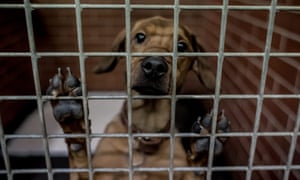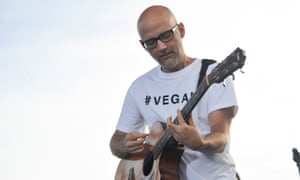
Proponents say it will make Los Angeles the world’s progressive capital. Sceptics say it will mean diarrhea, lots of diarrhea.
The proposal, which has divided scientists and animal rights groups and inflamed social media, is to put dogs in the city’s public shelters on a vegan diet.
The Los Angeles animal services commission is considering the idea after lobbying by prominent vegans, including Moby, the dance music pioneer.
The commission unanimously voted earlier this month for a feasability study and analysis of the benefits and risks. A report detailing pilot project options is expected in February.
Roger Wolfson, a commissioner and television screenwriter who is driving the initiative, cites ethical, environmental and health reasons to switch dogs to plant-based food.
Currently more than 20,000 chickens, 10,000 turkeys and 1,000 lambs die each year in order to be churned into food for the 33,000 dogs in LA’s public shelters, he said.
“We are the department of animal services, not the department of animal companion services,” he told the Guardian this week. “So we need to start from a place of avoiding unnecessary killing of animals. We already shelter pigs and chickens and turkeys and we wouldn’t think about killing them unnecessarily. So if dogs can get their needs met without killing animals we owe it to the citizens of Los Angeles to try.”
Wolfson, who was a political speechwriter in Washington DC before moving to LA and writing for shows such as Fairly Legal and Law & Order: Special Victims Unit, also cited the impact of meat and dairy consumption on deforestation, greenhouse gases and ocean dead zones.
Several high-profile allies endorsed Wolfson’s proposal at a public hearing in November, including the musician and DJ Moby, who owns a vegan restaurant in LA. “If we adopt this, it’s just one more thing that proves to the world that Los Angeles really is the progressive capital of the world,” he said, according to meeting minutes, which used his real name, Richard Hall.

However, the city’s chief veterinarian, Jeremy Prupas, cited clinical nutritionists, a veterinary toxicologist and other experts who advised against a vegan diet. In addition to health questions, workers at the understaffed shelter would confront canine diarrhea, “a big issue”, Prupas said.
Armaiti May, an LA-based veterinarian who supports the proposal, told the Guardian that abrupt changes in diet can lead to looser stools but that a gradual transition would avoid major problems. “It’s a small issue in the grand scheme of things.” May believes meat-based kibbles have fuelled a cancer and allergy epidemic in dogs.
Tracy Reiman, executive vice-president of the animal rights group Peta, said a vegan diet was healthier and more ethical than feeding dogs “factory farmed animals who have endured miserable lives and gruesome deaths and whose dead, dying, diseased, or disabled carcasses are found in most commercial dog foods”.
Other voices urge caution. Lisa Freeman, a veterinary nutritionist and Tufts university professor, told the New York Times earlier this year there were no long-term studies on the effects of veganism in dogs. “We know a lot about dog nutrition, but there are unknowns as well … it isn’t easy to formulate a high-quality diet for dogs, and it’s particularly difficult with a vegan diet.”
Social media has bristled with arguments for and against, the latter insisting dogs need meat.
Owners who have put their dogs on vegan diets say diarrhea fears are overblown and that health benefits are tangible. “Winky had been plagued with recurring ear infections which disappeared permanently after I phased the meat-based food out of his diet,” Karen Dawn, an author and activist, wrote in an LA Times op-ed.
Since you’re here …
… we have a small favour to ask. More people are reading the Guardian than ever but advertising revenues across the media are falling fast. And unlike many news organisations, we haven’t put up a paywall – we want to keep our journalism as open as we can. So you can see why we need to ask for your help. The Guardian’s independent, investigative journalism takes a lot of time, money and hard work to produce. But we do it because we believe our perspective matters – because it might well be your perspective, too.
I appreciate there not being a paywall: it is more democratic for the media to be available for all and not a commodity to be purchased by a few. I’m happy to make a contribution so others with less means still have access to information.Thomasine F-R.
[“Source-timesofindia”]

